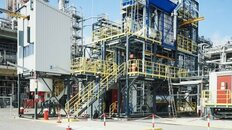- EUR 200 million invested to convert 160,000 metric tons of liquid biomass into renewable components.
- The new product will be available at 550 filling stations in Austria, Czech Republic, and Hungary in 2024.
- Co-processing reduces carbon footprint by 360,000 metric tons of CO2 annually.
- Feedstock includes waste-based and advanced materials like used cooking oil and liquid from nut shells.

Investment and Capacity
OMV has invested nearly EUR 200 million in its new co-processing plant at the Schwechat refinery in Austria. The facility is designed to convert up to 160,000 metric tons of liquid biomass into high-quality renewable hydrogenated vegetable oil (HVO) components.
Product Availability
The renewable components produced will be used in OMV’s MaxxMotion Diesel, featuring a new CleanTech+ formula. This product will be available at approximately 550 OMV filling stations in Austria, the Czech Republic, and Hungary by 2024.
Environmental Impact
The co-processing technology will enable OMV to reduce its carbon footprint by up to 360,000 metric tons of fossil CO2 annually. This reduction is equivalent to the emissions of 38,000 cars driving around the globe.
Feedstock Flexibility
The plant offers considerable feedstock flexibility, allowing the use of waste-based materials such as used cooking oil and advanced feedstocks like liquid from nut shells. These materials do not compete with food and feed production.
Compliance and Certification
The production process complies with EU requirements for sustainable fuel production and is certified according to ISCC-EU (International Sustainability & Carbon Certification).

